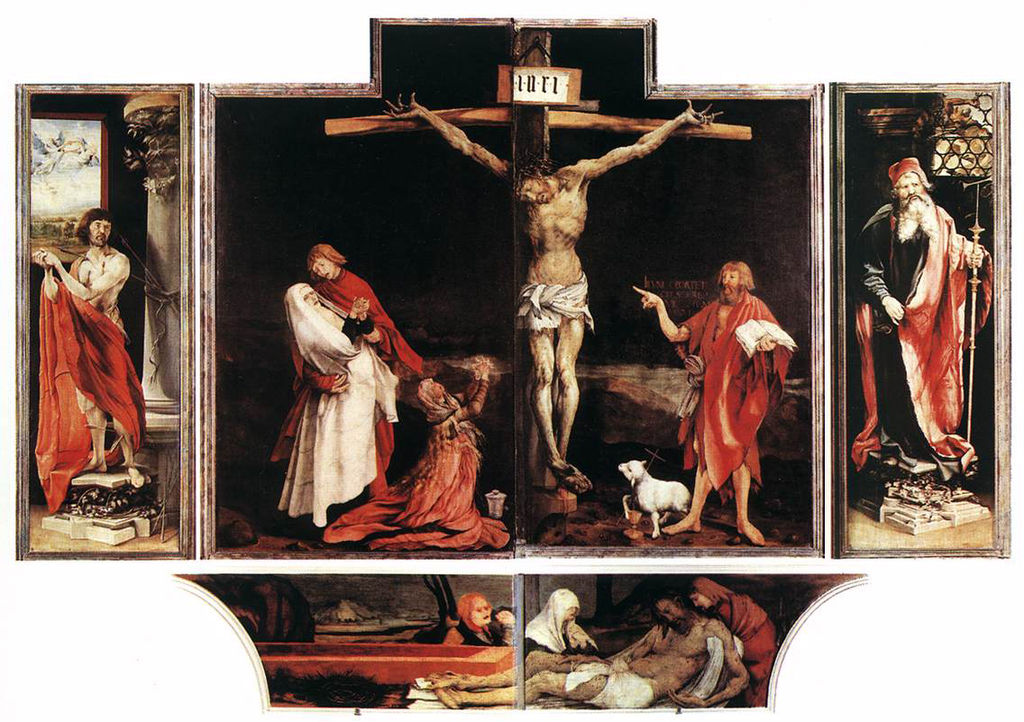|
By Alan Altany Yet it was our infirmities that he bore, our sufferings that he endured, While we thought of him as stricken, as one smitten by God and afflicted. Isaiah 53:4 In the chapel of the monastery’s hospital, the pure stench of boiling & erupting skin, going black gangrenous by the moment, rose up with a cacophony of suffered moans from the peasant patients grimly enduring St. Anthony’s fire, leprosy and plague as the monks cared for them and brought their brutally fouled bodies and afflicted souls before the painted Christ altarpiece, before the magnificent ugliness of a crucified Jesus who mirrored and consumed their own wounds, compelling their death-draining eyes towards this tortured, contorted figure perfectly abandoned, perfectly and savagely killed in frozen writhing: common people with commonly searing pustules, seizures, crunching spasms and hallucinations facing this night-drenched painting, this Christ. Grunewald painted in the hospital for years, daily seeing the stricken- down in their fatally drenched beds, stretching faith beyond breaking. His Christ: greyish–green flesh, gaping mouth, grave-blue lips, screaming hands, legions of sores heavy with death, a dead Jesus. This God of excess died like no other in dreadful beauty & unrestrained love, unrestricted, eternal empathy for His sin-corpsed, absurd humans, God now knowing their desolation and the terminal loneliness of their pain. Mother Mary, right of Jesus on the panel, collapses in John’s arms next to Mary Magdalene praying, begging; a decreasing John the Baptist to the left points fiercely to Jesus to increase. The whole chapel is a visceral scene gravitating everyone towards a gruesome, hideous Christ: eyes shut, head awfully dropped; a 16th-century painting intending miracles of body and faith by the execution of infinite compassion. Patients sense a mystical transfiguration of their poor dyings into acts of worship to the God who knew them with a mothering intimacy, seeing He sought them more deeply than their abysses, so deeply that hope found a way out of hell into hearts bowing before the infinite sacrifice of God, where He agonized in love for them and died so that they could finally become soulful fire ascending to be with the risen Christ in their new spirited-skin bodies. Jesus’s darkest night ever of any soul: a high point of art marked by the healing of tormented hearts of pushed down-and-out believers through a polyptych painting by a man whose name was not even Grunewald, but who had been touched by the reflected heat of St. Anthony’s fire and by the God of miracle-making who envisioned the painted panel itself into a miracle of a dramatically hidden resurrection, healing through immersion in death. Alan Altany, Ph.D., is a septuagenarian college professor of religious studies. He’s been a factory worker, swineherd on a farm, hotel clerk, lawn maintenance worker, small magazine of poetry editor, director of religious education for churches, truck driver, novelist, etc. He published a book of poetry in 2022 entitled A Beautiful Absurdity: Christian Poetry of the Sacred. His website is at https://www.alanaltany.com/.
'Grunewald's Crucifixion' first appeared in A Beautiful Absurdity: Christian Poetry of the Sacred. It has been republished here with the author's permission. Related work on Foreshadow: The Crucifixion of St Peter (Fiction, August 2022) Please support us by sharing this post and buying us a book.
0 Comments
Leave a Reply. |
Categories
All
ForecastSupport UsArchives
July 2024
|

 RSS Feed
RSS Feed
